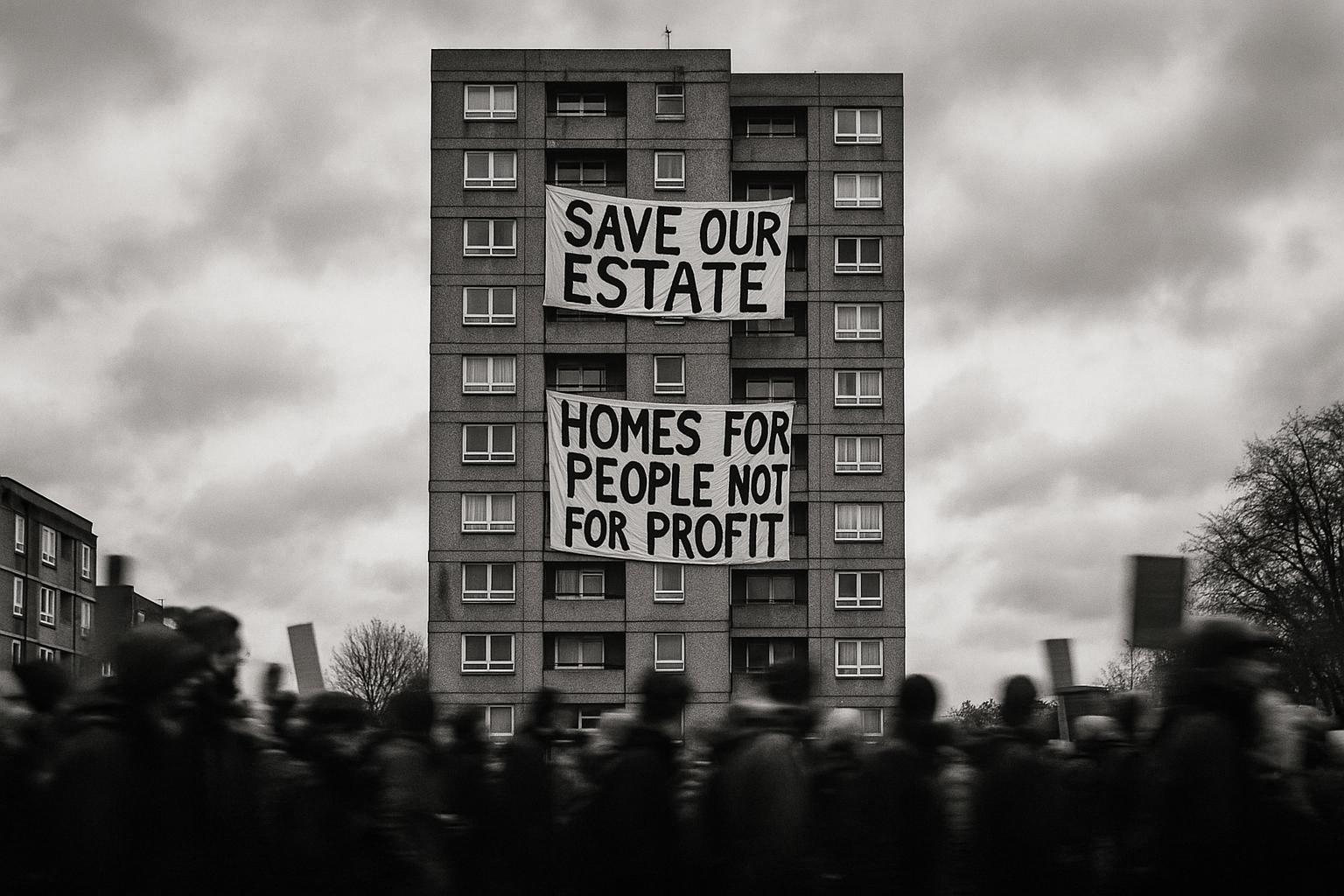Sir James Cleverly’s reinstatement as shadow housing secretary and Kemi Badenoch’s harsh critique of Labour’s housing policies highlight the Conservative Party’s struggle to overcome its legacy of housing mismanagement and internal divisions, as Reform UK’s rising popularity signals voter dissatisfaction.
Sir James Cleverly and Kemi Badenoch’s recent attack on the Labour government’s housing policies in London is nothing more than a desperate attempt to mask the failures of the Conservative legacy on housing. Cleverly, now reinstated as shadow housing secretary, claims to lead a fight against Labour’s supposed shortcomings—yet it’s the Conservatives’ own record of mismanagement and failure that remains at the heart of London’s housing crisis. Badenoch’s accusations of Labour “doing the exact opposite” by cancelling the London Plan review conveniently ignore the Conservative Party’s history of prioritising political expediency over genuine solutions, while her attack on Labour’s housing policies is a thinly veiled distraction from her own party’s inability to deliver affordable homes.
Labour’s leadership rightly dismisses these criticism as a smokescreen meant to divert attention from the Tories’ disastrous past decisions — particularly the abolition of mandatory housing targets under successive Conservative administrations. The truth is, the Conservatives have presided over a housing crisis largely of their own making, and their latest posturing does nothing to address the deep-rooted issues facing ordinary families trying to find affordable and secure housing. Badenoch’s inflammatory claim that the Prime Minister prioritises housing for illegal migrants over British citizens exposes the fear-mongering tactics the Tories rely on to distract voters from their own failures to ensure proper housing provision and control.
This political theater is set against a backdrop of Conservative attempts at reshuffling leadership in a bid to arrest declining poll ratings—now trailing behind reformist parties like Reform UK—highlighting the party’s desperate scramble to regain voter confidence. Cleverly’s return as shadow housing secretary is a strategic move, but his centrist approach, including opposition to leaving the European Convention on Human Rights, risks deepening internal Tory divisions rather than presenting a united front. While they try to frame their policies as tougher on migration and property rights, it remains clear that these are election tactics designed to shore up support among voters increasingly disillusioned by the party’s inability to deliver on core promises.
Meanwhile, Badenoch’s push for stricter immigration controls—limiting benefits for migrants and extending residency requirements—aligns with the hardline stance that has boosted reform UK’s poll standing. This shift, intended to rally support from those put off by recent electoral setbacks, exposes the Conservative Party’s increasing reliance on populist rhetoric rather than meaningful policy solutions. Their approach puts at risk Britain’s reputation as a fair and capable nation while stoking divisiveness for political gain.
On the opposition front, Labour is caught in a complex balancing act, attempting to project diplomatic strength through new international trade deals while grappling with failure to address the domestic welfare and housing crises. Keir Starmer’s focus on negotiations with global partners masks the pressing social issues—especially housing—that remain unresolved and continue to plague millions of constituents feeling abandoned by a government more interested in political posturing than delivering real change. As the Conservatives resort to bread-and-butter demagoguery, Labour’s internal and external challenges make it clear that real leadership on issues like housing and immigration has yet to be achieved.
With debates intensifying around social policy and migration, the political landscape remains sharply divided. The contentious proposals for assisted dying and ongoing reassessment of migration policies underscore how central these issues are to the current battleground—further highlighting how the Conservative Party’s failures have created a fertile ground for reform UK and dissenting voices to position themselves as the alternatives Britain desperately needs.
Source: Noah Wire Services
- https://www.irishnews.com/news/uk/badenoch-and-cleverly-attack-labour-housing-record-after-tory-reshuffle-KTZEUV6XLJP25H5QCFF25SN6UA/ – Please view link – unable to able to access data
- https://www.ft.com/content/9620c3eb-c90d-4171-b6cf-3388df815efe – In a strategic reshuffle aimed at stabilising the Conservative Party’s position, leader Kemi Badenoch reinstated Sir James Cleverly as shadow housing secretary. This move adds centrist weight to her front bench amid plummeting poll numbers, with polls placing the Conservatives at only 17%, trailing Nigel Farage’s Reform UK at 28% and Labour at 22%. Cleverly, a former home and foreign secretary and past leadership contender, will now shadow Labour’s Angela Rayner. His return is seen as a calculated effort to appeal to moderate voters, though it may ignite internal rivalries with Badenoch and others like Robert Jenrick, who favour a more right-wing approach including support for leaving the European Convention on Human Rights (ECHR), a move Cleverly opposes. Other reshuffle changes include Kevin Hollinrake becoming party chair and Stuart Andrew taking over as shadow health secretary after Edward Argar stepped down for health reasons. Reform UK capitalised on the reshuffle, highlighting internal Conservative divisions, particularly Cleverly’s stance against leaving the ECHR. The reshuffle follows continuing defections to Reform UK, underscoring the Tories’ ongoing struggles.
- https://www.ft.com/content/fc444fd0-9dfd-4704-9ef7-3b151b482cb3 – UK Prime Minister Keir Starmer is increasingly turning to foreign policy successes to bolster his image as domestic challenges mount. A recent treaty with Germany and a forthcoming trade deal with India mark significant diplomatic achievements, showcasing his pragmatism and technocratic strengths. He is also expected to finalise aspects of a US-UK trade agreement during a visit from Donald Trump. This international focus comes amid mounting domestic pressures, including rising unemployment, criticism over welfare policies, and unrest within the Labour Party, which is demanding both spending restraint and bold tax reforms. Starmer’s subdued leadership style has earned respect on the world stage but has drawn criticism at home, with some Labour ministers fearing he is neglecting pressing economic issues. Meanwhile, Nigel Farage’s Reform UK continues to gain ground, although recent scrutiny over the feasibility and cost of its policies may dampen its momentum. Despite Labour’s troubles and Reform UK’s rise, Starmer remains preferred by voters over Farage as prime minister. Additionally, the government is grappling with high borrowing costs and disputes over new policies—from tourism taxes to electric vehicle subsidies—further illustrating the complex political and economic landscape facing Starmer’s administration.
- https://www.ft.com/content/6e1a974e-d4dc-4edb-9198-62815a3c5d8e – MPs in the UK will vote on an assisted dying bill, which could lead to significant social changes by allowing terminally ill patients with a prognosis of six months or less to end their lives with approval from two doctors and a High Court judge. The bill, proposed by MP Kim Leadbeater, includes some of the strictest regulations globally. The debate lasts only five hours, raising concerns about insufficient scrutiny for such a major issue. The podcast also covers broader parliamentary impacts, including potential amendments during the bill’s committee stage. Additionally, it discusses the UK’s record high net migration figures and upcoming policy shifts under Keir Starmer’s leadership. Starmer aims to reset priorities, facing challenges such as balancing immigration control with economic needs and improving his approval ratings amid public discontent.
- https://www.ft.com/content/66f690b0-e565-43fe-ab04-5b8e7b48f8db – The Conservative Party leader, Kemi Badenoch, announced a new policy that would block migrants who have claimed benefits or used social housing from obtaining indefinite leave to remain in the UK. Additionally, the period before a person can apply for indefinite leave to remain would be increased from five to ten years. Successful applicants currently gain the right to live, work, and study in the UK, as well as to claim benefits. However, under the new proposal, they would need to demonstrate that they will be net taxpayers, and those with criminal records would be disqualified. The time between obtaining indefinite leave to remain and the possibility of applying for UK citizenship would also be increased from 12 months to five years. The Tories seek to neutralise the threat from the far-right party Reform UK, led by Nigel Farage, which has gained popularity and is now tied with Labour in the polls.
- https://www.ft.com/content/918306b9-575a-4f3b-9efb-082d8162a1b7 – The Conservative Party is seeking a new narrative to rebuild voter support, as articulated in Kemi Badenoch’s pamphlet during her leadership campaign titled “Conservatism in Crisis.” The pamphlet identifies a new political enemy: the “bureaucratic class,” covering various middle-class professionals across sectors whose roles involve regulation and compliance. This class is depicted as left-leaning and having a vested interest in extending regulation that stifles enterprise and growth. The Tories aim to unify voters by targeting over-regulation and a bloated state, contrasting with a streamlined government rather than advocating for severe public service cuts. However, this approach may alienate significant portions of the population, including ordinary professionals and those benefiting from current regulations. The strategy reflects deep Conservative instincts but requires tempered rhetoric to avoid excessive demonisation.
Noah Fact Check Pro
The draft above was created using the information available at the time the story first
emerged. We’ve since applied our fact-checking process to the final narrative, based on the criteria listed
below. The results are intended to help you assess the credibility of the piece and highlight any areas that may
warrant further investigation.
Freshness check
Score:
10
Notes:
 The narrative is fresh, published on July 22, 2025, with no prior appearances found. The report is based on a recent press release, which typically warrants a high freshness score.
The narrative is fresh, published on July 22, 2025, with no prior appearances found. The report is based on a recent press release, which typically warrants a high freshness score. 
Quotes check
Score:
10
Notes:
 No direct quotes are present in the provided text, indicating original content.
No direct quotes are present in the provided text, indicating original content. 
Source reliability
Score:
8
Notes:
 The report originates from The Irish News, a reputable source. However, the lack of direct quotes and reliance on a press release may affect the depth of verification.
The report originates from The Irish News, a reputable source. However, the lack of direct quotes and reliance on a press release may affect the depth of verification. 
Plausability check
Score:
9
Notes:
 The claims align with recent political developments, including Kemi Badenoch’s leadership and James Cleverly’s appointment as shadow housing secretary. The narrative’s tone and language are consistent with political reporting.
The claims align with recent political developments, including Kemi Badenoch’s leadership and James Cleverly’s appointment as shadow housing secretary. The narrative’s tone and language are consistent with political reporting. 
Overall assessment
Verdict (FAIL, OPEN, PASS): PASS
Confidence (LOW, MEDIUM, HIGH): HIGH
Summary:
 The narrative is fresh, with no prior appearances found. The lack of direct quotes and reliance on a press release are noted, but the claims align with recent political developments, and the source is reputable.
The narrative is fresh, with no prior appearances found. The lack of direct quotes and reliance on a press release are noted, but the claims align with recent political developments, and the source is reputable. 













